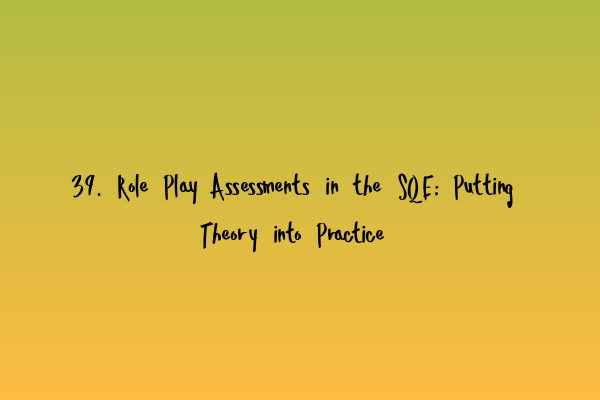39. Role Play Assessments in the SQE: Putting Theory into Practice
Welcome to SQE Exam Law, your trusted source for all things related to the Solicitors Qualifying Examination (SQE). In this blog post, we will be delving into the topic of Role Play Assessments in the SQE, and how they allow candidates to put their theoretical knowledge into practical application. This form of assessment is a vital component of the SQE, as it tests not only legal knowledge but also communication and problem-solving skills.
Before we dive deeper into the role play assessments, let’s take a moment to understand what the SQE is and its significance in becoming a qualified solicitor in England and Wales. If you need a refresher on the basics of the SQE, you can check out our previous article on Solicitors Qualifying Examination (SQE): Your Gateway to Legal Practice.
Now, let’s focus on the role play assessments in the SQE. These assessments simulate real-life scenarios that solicitors often encounter in their practice. The aim is to assess the candidate’s ability to apply legal knowledge to solve problems, communicate effectively with clients, and demonstrate professional judgment.
Why are Role Play Assessments Important?
Role play assessments play a crucial role in the SQE for several reasons:
- Application of Legal Knowledge: Role play assessments allow candidates to demonstrate their understanding of legal principles and apply them to realistic scenarios. This assessment format ensures that candidates can utilize their theoretical knowledge in a practical context, mirroring the challenges they will face as solicitors.
- Communication Skills: Effective communication is a vital skill for solicitors, and the role play assessments provide candidates with an opportunity to showcase their ability to communicate clearly, concisely, and persuasively. Candidates must be able to explain legal concepts to clients in a manner that is easily understandable and build rapport with them.
- Problem-Solving Abilities: Solicitors are often confronted with complex legal issues that require analytical thinking and problem-solving skills. Role play assessments test a candidate’s ability to identify the key legal issues, propose appropriate solutions, and navigate through challenging client interactions.
By incorporating role play assessments into the SQE, the examination aims to ensure that candidates possess the practical skills necessary to excel in their future legal careers.
Tips for Excelling in Role Play Assessments
Now that we understand the importance of role play assessments, let’s explore some valuable tips for excelling in this component of the SQE:
- Preparation is Key: Familiarize yourself with various legal scenarios that you may encounter during the role play assessments. Review case studies and practice applying legal principles to different factual situations. Our previous article on SQE Case Studies: Applying Knowledge in Real-Life Scenarios can provide you with some useful insights.
- Develop Active Listening Skills: Effective communication starts with active listening. Focus on understanding the client’s concerns and requirements, and tailor your responses accordingly. Pay attention to non-verbal cues, such as body language, to gauge the client’s emotions and respond empathetically.
- Think on Your Feet: Role play assessments often involve unexpected twists and turns. Be prepared to adapt your approach and think on your feet when faced with new information or challenging client reactions. Practice scenarios that require you to pivot your strategy and propose alternative solutions.
- Balance Legal Knowledge and Practical Advice: While it’s important to demonstrate your legal knowledge, remember that clients seek practical advice and solutions. Don’t get lost in complex legal jargon. Instead, focus on providing clear and actionable advice that addresses the client’s concerns effectively.
By following these tips, you can enhance your performance in role play assessments and increase your chances of success in the SQE.
Integrating Role Play Assessments into Your Study Plan
If you’re wondering how to incorporate role play assessments into your study plan, we have some strategies to share:
- Join Study Groups: Engage in role play exercises with fellow candidates to practice your skills. This approach allows you to receive feedback and learn from others’ perspectives.
- Seek Professional Guidance: Consider enrolling in preparation courses or workshops that specifically focus on role play assessments. Trained professionals can provide valuable insights and help you refine your approach.
- Simulate Real-Life Scenarios: Create your own scenarios or utilize case studies that closely resemble what you may encounter in practice. This will allow you to develop your critical thinking and problem-solving abilities.
Remember, success in role play assessments requires a combination of legal knowledge, analytical thinking, and effective communication skills. By incorporating role play exercises into your study plan, you can prepare yourself thoroughly for this important component of the SQE.
Final Thoughts
Role play assessments are an integral part of the SQE, as they provide candidates with an opportunity to showcase their ability to apply legal knowledge in real-life scenarios. These assessments test a candidate’s communication skills, problem-solving abilities, and overall professional judgment. By understanding the importance of role play assessments and implementing the tips shared in this article, you can excel in this component of the SQE and bring yourself closer to becoming a qualified solicitor.
For more strategies and tactics to excel in the SQE, check out our related articles:
- SQE Strategies: Proven Tactics to Ace the Solicitors Qualifying Examination
- SQE Case Studies: Applying Knowledge in Real-Life Scenarios
- SQE Exam Strategy: Planning and Executing for Optimal Performance
- Mastering Time Management in SQE: Strategies for Efficient Exam Completion
Stay tuned to SQE Exam Law for more informative articles and resources to help you navigate the Solicitors Qualifying Examination journey successfully!
